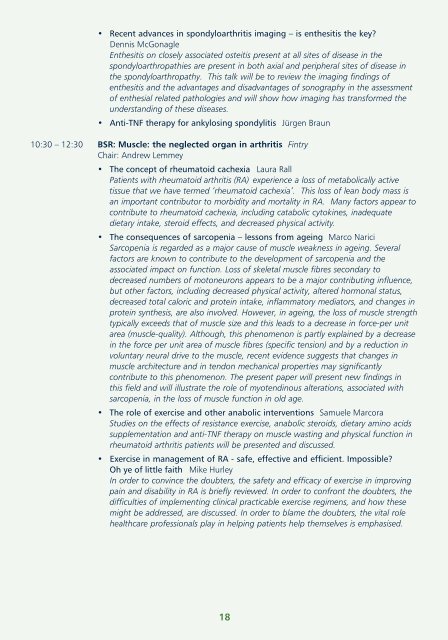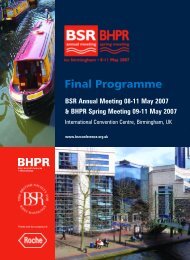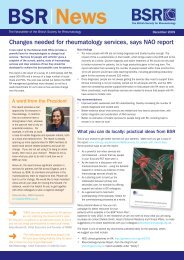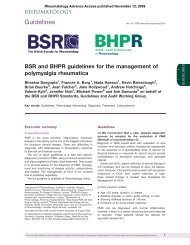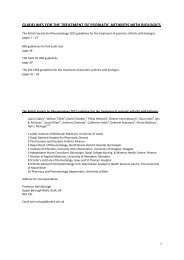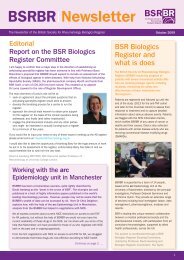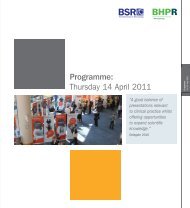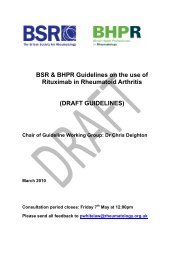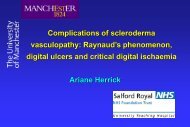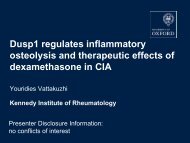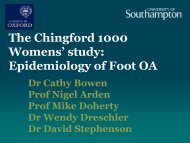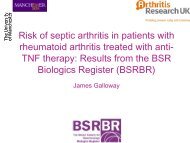View conference programme - The British Society for Rheumatology
View conference programme - The British Society for Rheumatology
View conference programme - The British Society for Rheumatology
You also want an ePaper? Increase the reach of your titles
YUMPU automatically turns print PDFs into web optimized ePapers that Google loves.
• Recent advances in spondyloarthritis imaging – is enthesitis the key?<br />
Dennis McGonagle<br />
Enthesitis on closely associated osteitis present at all sites of disease in the<br />
spondyloarthropathies are present in both axial and peripheral sites of disease in<br />
the spondyloarthropathy. This talk will be to review the imaging findings of<br />
enthesitis and the advantages and disadvantages of sonography in the assessment<br />
of enthesial related pathologies and will show how imaging has trans<strong>for</strong>med the<br />
understanding of these diseases.<br />
• Anti-TNF therapy <strong>for</strong> ankylosing spondylitis Jürgen Braun<br />
10:30 – 12:30 BSR: Muscle: the neglected organ in arthritis Fintry<br />
Chair: Andrew Lemmey<br />
• <strong>The</strong> concept of rheumatoid cachexia Laura Rall<br />
Patients with rheumatoid arthritis (RA) experience a loss of metabolically active<br />
tissue that we have termed ‘rheumatoid cachexia’. This loss of lean body mass is<br />
an important contributor to morbidity and mortality in RA. Many factors appear to<br />
contribute to rheumatoid cachexia, including catabolic cytokines, inadequate<br />
dietary intake, steroid effects, and decreased physical activity.<br />
• <strong>The</strong> consequences of sarcopenia – lessons from ageing Marco Narici<br />
Sarcopenia is regarded as a major cause of muscle weakness in ageing. Several<br />
factors are known to contribute to the development of sarcopenia and the<br />
associated impact on function. Loss of skeletal muscle fibres secondary to<br />
decreased numbers of motoneurons appears to be a major contributing influence,<br />
but other factors, including decreased physical activity, altered hormonal status,<br />
decreased total caloric and protein intake, inflammatory mediators, and changes in<br />
protein synthesis, are also involved. However, in ageing, the loss of muscle strength<br />
typically exceeds that of muscle size and this leads to a decrease in <strong>for</strong>ce-per unit<br />
area (muscle-quality). Although, this phenomenon is partly explained by a decrease<br />
in the <strong>for</strong>ce per unit area of muscle fibres (specific tension) and by a reduction in<br />
voluntary neural drive to the muscle, recent evidence suggests that changes in<br />
muscle architecture and in tendon mechanical properties may significantly<br />
contribute to this phenomenon. <strong>The</strong> present paper will present new findings in<br />
this field and will illustrate the role of myotendinous alterations, associated with<br />
sarcopenia, in the loss of muscle function in old age.<br />
• <strong>The</strong> role of exercise and other anabolic interventions Samuele Marcora<br />
Studies on the effects of resistance exercise, anabolic steroids, dietary amino acids<br />
supplementation and anti-TNF therapy on muscle wasting and physical function in<br />
rheumatoid arthritis patients will be presented and discussed.<br />
• Exercise in management of RA - safe, effective and efficient. Impossible?<br />
Oh ye of little faith Mike Hurley<br />
In order to convince the doubters, the safety and efficacy of exercise in improving<br />
pain and disability in RA is briefly reviewed. In order to confront the doubters, the<br />
difficulties of implementing clinical practicable exercise regimens, and how these<br />
might be addressed, are discussed. In order to blame the doubters, the vital role<br />
healthcare professionals play in helping patients help themselves is emphasised.<br />
18


